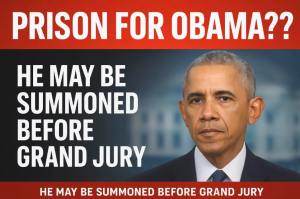Obama Trapped – Could He Face a Grand Jury Over “Russiagate”?
The political landscape in Washington was shaken this August when reports emerged that the Department of Justice, under Attorney General Pam Bondi, had convened a federal grand jury to examine allegations surrounding the origins of the Trump–Russia investigation during the Obama administration. The move, confirmed by multiple outlets, has raised the possibility that senior officials from that era—and perhaps even former President Barack Obama himself—could be drawn into legal jeopardy.
The story is both politically explosive and legally complex. To understand the stakes, one must revisit the long and controversial history of “Russiagate,” examine the evidence that is now being reviewed, and assess the actual risks facing Obama and his former aides.
What Is Being Investigated?
The new grand jury inquiry is focused on whether Obama-era officials fabricated or exaggerated intelligence assessments in 2016 that linked Donald Trump’s campaign to Russian interference. According to a referral from Director of National Intelligence Tulsi Gabbard, recently declassified documents suggest a coordinated effort to amplify claims of collusion.
Pam Bondi acted on that referral, ordering prosecutors to present the matter before a grand jury in Washington. This panel now has the authority to subpoena witnesses, examine classified reports, and decide whether criminal charges should follow.
The central question: Did government officials misuse their positions to launch a politically motivated investigation against Trump, and if so, who was responsible?
The Potential Targets
While speculation swirls about Obama himself, the names most frequently mentioned are his top national security officials:
-
James Clapper, former Director of National Intelligence
-
John Brennan, former CIA Director
-
James Comey, former FBI Director
Each played a role in intelligence assessments and public statements about Russia’s interference. The grand jury will likely scrutinize their communications, testimony, and whether they misled Congress or the American public.
Obama’s direct role remains uncertain. Documents have shown that he was briefed on Russia’s interference and approved steps to respond, but whether he personally directed actions now under suspicion is unproven. Still, critics argue that as president, he bore ultimate responsibility.
Legal Challenges
Despite sensational headlines, bringing a case against Obama would be extraordinarily difficult. Three key legal hurdles stand out:
-
Statutes of limitation
Many of the alleged actions—false statements, misuse of intelligence—occurred nearly a decade ago. Certain offenses, like lying to Congress, typically have a five-year limit. Unless prosecutors can argue for extensions, time may already have run out on many potential charges. -
Presidential immunity
The Supreme Court recently expanded the doctrine of presidential immunity, holding that presidents cannot be criminally prosecuted for actions within the scope of their official duties. If Obama is accused of directing intelligence assessments, his defense would argue this was clearly within his presidential role. -
Proof of intent
Even if false statements were made, prosecutors would need to prove they were deliberately fabricated, not simply the product of flawed intelligence or misinterpretation. That is a high bar in national security cases.
For these reasons, many legal analysts doubt that Obama himself is truly at risk, even if his former aides face more direct exposure.
Political Reactions
The political fallout, however, is already intense.
Republicans, led by Donald Trump, have framed the investigation as overdue accountability. Trump has publicly declared that “Russiagate was the biggest hoax in American history” and that those responsible should face justice. Conservative media has celebrated the grand jury as a vindication of Trump’s long-standing complaints that he was unfairly targeted.
Democrats, by contrast, see the investigation as nakedly political. Obama’s office dismissed the allegations as “baseless” and “intended to distract from the crises of the present.” Senior Democratic lawmakers, including Senator Mark Warner and Representative Jim Himes, have emphasized that multiple bipartisan reports previously confirmed Russia’s interference in 2016 and accused the current DOJ of rewriting history to score political points.
This divide reflects broader polarization: for Trump supporters, the grand jury is a long-awaited reckoning; for Democrats, it is a weaponization of justice.
Revisiting Russiagate
The term “Russiagate” refers to the sprawling set of investigations into Russian meddling during the 2016 election and whether the Trump campaign conspired with Moscow.
-
In 2017, Special Counsel Robert Mueller launched a two-year investigation, which concluded that Russia interfered but did not find sufficient evidence of criminal conspiracy by Trump’s campaign.
-
Critics of the investigation argue that it relied on dubious intelligence, including the so-called Steele dossier, which contained unverified claims about Trump and Russia.
-
Supporters counter that the interference was real and that investigating it was the government’s duty.
The new grand jury inquiry seeks to revisit those origins: Were the warnings about Trump inflated for political reasons? Or were they legitimate, if imperfect, assessments of a real national security threat?
Could Obama Actually Be Charged?
The prospect of Obama facing indictment remains remote. While headlines suggesting he is “trapped” capture attention, legal experts caution against overstatement.
At most, Obama could be questioned about his knowledge of decisions made by his intelligence chiefs. Unless direct evidence surfaces that he personally ordered officials to falsify reports—a claim for which no proof has yet been made public—he is unlikely to face legal exposure.
His aides, however, may not be as insulated. If Clapper, Brennan, or Comey are found to have knowingly misled Congress or manipulated intelligence, they could face charges. Even then, defenses would be strong, citing reliance on classified sources, conflicting intelligence, and the difficulty of proving deliberate deception.
Why This Matters Now
Beyond the legal questions, the investigation has deep political resonance.
-
It reframes the narrative of 2016, turning focus from Trump’s controversies to Obama’s legacy.
-
It fuels Republican claims that institutions like the FBI and CIA were “weaponized” against Trump.
-
It underscores how partisan battles over past elections continue to shape the present political climate.
For the public, the result may be further erosion of trust in institutions. If former officials are indicted, it will deepen the sense that intelligence and law enforcement were politicized. If the grand jury finds no wrongdoing, critics will argue the investigation was itself a political stunt.
Either way, the saga ensures that the shadow of 2016 will continue to loom large over American politics in 2025.
Conclusion
The announcement that a federal grand jury is reviewing allegations against Obama-era officials marks a dramatic turn in the long-running debate over Russiagate. While the legal risk to Barack Obama himself is likely minimal due to immunity and evidentiary hurdles, the probe is certain to stir controversy, ensnare some of his closest aides, and keep partisan fires burning.
Whether the investigation produces indictments or fizzles out, it underscores a sobering truth: nearly a decade after the 2016 election, the United States remains locked in battles over its meaning, its consequences, and who, if anyone, should be held accountable
